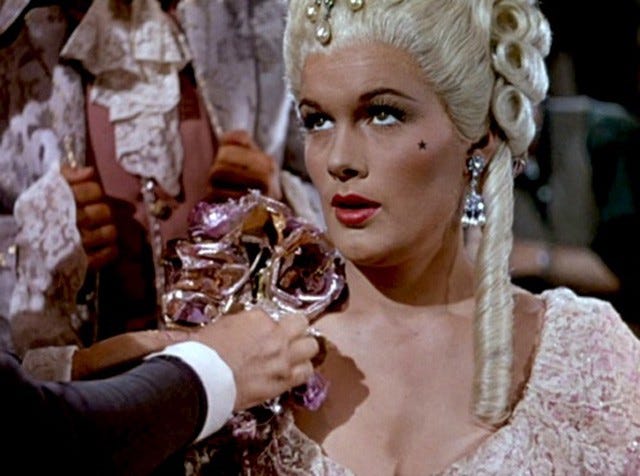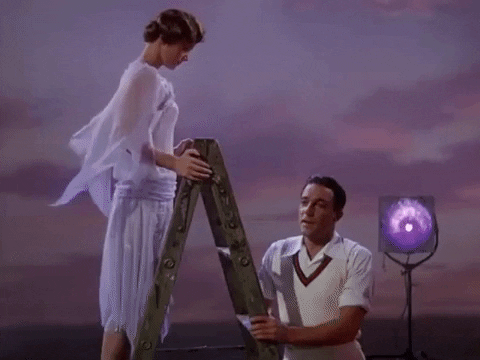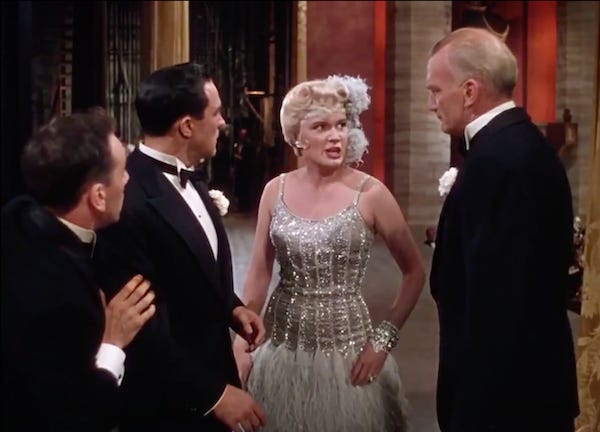[substack archives] I'm gonna do my own talking
![[substack archives] I'm gonna do my own talking](/content/images/size/w960/2021/05/https___bucketeer-e05bbc84-baa3-437e-9518-adb32be77984.s3.amazonaws.com_public_images_56aefcb7-df39-499b-b650-dd967b07ca4c_640x476.jpeg)
A Turner Classic Movies Fever Dream
Originally published on Substack by Alex Brown on October 20, 2019
a dispatch from the inside of my brain

ID: Lina Lamont (Jean Hagen) rolls her eyes.
The first time I remember watching the 1952 film Singin’ in the Rain, I was in middle school social studies class. Our teacher, a (cis-het, white, male) libertarian who liked to say things like “The Civil War wasn’t actually about slavery,” showed us the movie, ostensibly to showcase the historical transition between silent movies and talkies. But I had noticed a pattern in my teachers, all of whom were working in unstable, difficult conditions under the late-2000s, union-busted, Scott-Walker-dictated climate of Wisconsin public schools. Whenever they didn’t really want to teach, they just put on a movie. So I found myself watching Gene Kelly dance ridiculously.
If you somehow haven’t seen Singin’ in the Rain, the film follows 1920s Hollywood actors Don Lockwood (Gene Kelly), Lina Lamont (Jean Hagen) and Kathy Selden (Debbie Reynolds). Don and Lina are working for a silent film company that quickly realizes they need to, uh, pivot to video — to with sound. Talking pictures! However, an issue quickly arises: while Lina is visually stunning on the screen (“she’s so refined, I think I’ll kill myself,” one audience member says, Mean Girls style), her speaking voice is abrasive, nasally and high-pitched.
Because Singin’ in the Rain is a comedy, this plot point is played for laughs. In fact, Lina doesn’t even speak for the first thirteen minutes of the film, but stands next to Don while he gives speeches at the awards show, a ventriloquist’s doll, a visual idol. Then, when she finally does speak, she says things like HEY WHAT’S THE BIG IDEA in a Muppet’s voice. She’s completely oblivious to the fact that people don’t like her voice.
This is all I could focus on while watching the film in that class, and it’s something I haven’t been able to stop thinking about since.
We talk about women’s voices a lot. Outspoken women are “shrill,” rich women with vocal fry are vapid, women end every sentence? like a question?, women speak with ephemeral “low and thrilling” voices that make people lean towards them, women squeak and warble, women have voices that are dark like tinted glass, women fake their voices to be deeper so that they may collect more people’s blood. This 2016 article, which mentions the copious amount of criticism that Hillary Clinton received for her voice, asks, Can a woman’s voice ever be right?
I have this voice disorder called muscle tension dysphonia, which basically means that the muscles around my vocal cords tense up and make my voice really strained and high pitched — essentially, when this is happening, it sounds like I’m always about to cry. It happens when it’s hot outside or when I exercise or when I can’t breathe and, as I’ve discovered recently, it happens when I’m stressed. It’s been happening for the past couple of weeks and I feel extremely weird about it. Combined with the fact that I’m getting sinus surgery in a few weeks, which means not only is my voice nasally as hell but I’m also stressed about the surgery, my voice is pretty messed up right now.
And I am extremely aware of it all. I hate talking to my coworkers, I hate answering the phone, I hate straining to be understood. I don’t want to interview anyone or be interviewed by anyone. (Also a few days ago I was in a Starbucks bathroom and I guess the lock was broken and someone started entering the code and I tried to do the whole “uh, occupied!” thing three times except he couldn’t hear me so he just entered the bathroom anyway, which was great.)
So anyway, back to the Gene Kelly flick.

[ID: a GIF of Don singing to Kathy in the iconic scene, awash in pink light in a movie set. The GIF is captioned “You were meant for me.”
Caption: Don Lockwood puts the moves on Kathy, the beautiful woman with the clear, full voice and the transatlantic accent, by trespassing onto a movie set.
The film hinges almost entirely on the inadequacy of female voices, of Lina’s voice and its direct opposition to audiences (meta and otherwise) perceiving her as beautiful. Lina is portrayed as unlikeable, her voice hitting pitch tones somewhere between the Wicked Witch of the West and Betty Boop. Kathy is to provide the voiceover for Lina and receive on-screen credit for doing so, not only for this film, but as Lina demands, for the next five years, which would render both women's careers basically nonexistent. I’m not expecting this sixty-seven-year-old film to be a pinnacle of feminist thought, but there’s something to be said about the fact that the plot revolves entirely on the pitting of two women against each other for one reason: their voices.
Beyond the film’s portrayal of women, other concerns exist in the casting and filming of the movie. Debbie Reynolds (Kathy) was 19 and Gene Kelly was 40. Gene was short-tempered and disliked Debbie Reynolds, despite the fact that she danced until blood vessels burst in her feet, sometimes slept overnight on set to avoid her 4:00 a.m. bus commute, endured a non-consensual French kiss from Gene Kelly, and eventually remarked in her memoir that making Singin’ in the Rain and giving birth were the two hardest things she’d ever had to do.

[ID: Lina Lamont, in a sparkly evening gown, snarls at three executive men in tuxedos.)
Caption: “Everybody’s always making speeches for me, but tonight I’m gonna do my own talking, I’m gonna make the speech!”
Lina storms onstage and gives a speech with her normal voice, clashing midatlantic speech patterns (“the dahncing cavalier”) and lower-class colloquialisms (“our hard work ain’t been in vain for nothin’”), confusing the audience. She’s asked to sing, and rushes backstage panicking. The men yell at both women and force Kathy to sing from behind the curtain. Kathy says that she’ll do it, but that she never wants to see Don again. The audience falls for the trick until the men decide to raise the curtain, exposing the whole facade. The audience bursts into raucous laughter. Lina runs away, and so does Kathy, but Don yells for the audience to stop Kathy, and starts singing to her. They sing romantically to each other and go on to star in another movie, Singin’ in the Rain, having made up I guess because Don allowed Kathy to have her own career. We never see Lina again.
As this Hairpin (RIP) piece says: Lina Lamont dances for no one. She doesn’t have a song of her own in the film, but she absolutely should. Kathy, the quiet, proper, palatable girl with the beautiful voice is brought out from behind the curtain, and Lina is effectively swept behind it. Yes, Lina is a bad bitch — dare I say, radically unpleasant? — but we don’t get to see where she and her fiercely unlikeable voice end up. I get that this film is a classic. The dance scenes are joyful. The costumes are fantastic. But it’s hard to focus on this film as a piece of practically perfect cinema when all I can think about is the disappearance of my gorgeous problematic fave, Lina!!!
I want to apologize for my voice every time I open my mouth. It’s a different situation than Lina’s; I’m not outspoken and shrill but rather too quiet and, on bad days, too difficult for this normative society to understand. Even though my gut instinct is to say sorry before I begin saying what I actually want to say, and even though I am going to do voice therapy because I want to feel confident again, I’m not going to apologize for the way my body works.
It’s almost the ‘20s again. I’m going to Daisy Buchanan this shit with the confidence of Lina Lamont. People will just have to lean in.

![[substack archives] puresound letter 002: remembering everyone](/content/images/size/w750/2021/05/puresound-002.png)
![[substack archives] puresound 001: pride month forever](/content/images/size/w750/2021/05/https___bucketeer-e05bbc84-baa3-437e-9518-adb32be77984.s3.amazonaws.com_public_images_2d371990-9fb9-47b8-8a18-035229ee30d4_1000x667.jpeg)